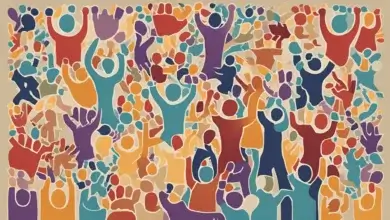
Table of Contents

Displacement due to conflict, natural disasters, or other crises is an extremely traumatizing experience affecting millions of people worldwide. Forced uprooting from one’s home, community, and familiar environment can cause serious and long-lasting mental health problems. The level of trauma caused by displacement and consequent mental health disorders are topics which this paper discusses. We can provide support by such understanding to the displaced persons and advocate effective interventions.
The Trauma of Displacement
Displacement is a complex experience wherein one is bereaved of a home, community, and, sometimes, the near ones. There is a coexistence with a variety of stressors likely to cause tremendous psychological trauma.
Loss of Home and Stability
The home is not only a physical structure; the home means being safe, stable, and with ‘your’ people. Thus, losing one’s home may be accompanied by feelings of insecurity, disorientation, and deep feelings of loss.
Disruption of Social Networks
Displacement is often accommodative of the fragmentation of social networks. Family members, friends, and community members who provide emotional and practical support are scattered or lost more often than not. It is this loss of social support that may heighten the feelings of isolation and loneliness.
Exposure to Violence and Trauma
Many displaced persons have been exposed to maximal doses of violence, such as war, persecution, and human rights violations. Having directly witnessed or experienced such events is associated with PTSD, which is characterized by intrusive memories, hypervigilance, and emotional numbing.
Mental Health Consequences of Displacement
The trauma caused by displacement might manifest in different mental disorders and vary from one person to another according to individual experiences, the degree of resilience, and access to all kinds of support.
Post-Traumatic Stress Disorder
Toni WP PTSD is one of the common consequences of displacement-related traumatic experiences. Major symptoms include flashbacks, nightmares, severe anxiety, and uncontrollable thoughts about the traumatic events. Sometimes, displaced persons also suffer from a state of hyper-arousal, being on edge all the time and very easy to be startled.
Depression
Loss, uncertainty, and hardships linked with displacement may then lead to depression. The symptoms are: sadness or loss of interest in activities, feelings of hopelessness, change in sleep and appetite. It is a very serious impairment of functioning, and such a person can’t adequately cope with everyday life.
Anxiety Disorders
Furthermore, displacement can result in anxiety disorders, including GAD, panic disorder, and social anxiety disorder. Among the most important symptoms that can be developed by a victim include excessive worry, attacks of panic, and fear of social interactions, which highly complicate the adaptation to new circumstances and surroundings.
Adjustment Disorders
Adjustment disorder is an illness that results when an individual is unable to cope with some serious change in one’s life or with any other significant stressor, such as displacement. The major symptoms include emotional discomfort, behavioral change, and impairment in daily functioning. In principle, adjustment disorders are transitory, but in a situation where the stressors have not resolved, they can become chronic.
Grief and Bereavement
Displacement is often intertwined with the processes of mourning and bereavement due to the loss of loved ones, homes, and communities. This grieving process can be complicated as a result of the lack of closure and persistence of instability, which can lead to prolonged and intense emotional suffering.
Vulnerable Populations
Particular groups within the displaced population are found to be vulnerable to mental health issues, such as children, women, and the elderly.
Children and Adolescents
Children and adolescents, in particular, are able to feel all the psychological implications of displacement. Their education gets disrupted; they may get separated from members of their families and be exposed to violence, leading to developmental delays alongside behavioral problems, while also having the potential effect on their mental health leading to PTSD and depression.
Women
Women are equally affected like men but tend to bear greater responsibility for the well-being of children and other dependants.
Women, in particular, are reported to be more vulnerable to displacement, placing them at future risks of gender-based violence, exploitation, and poor reproductive and maternal care. This entire situation puts a lot of stress on the mental health issues and interferes with the recovery process.
The Elderly
Elderly people are usually weak, and thus their resilience to the physical and emotional demands of displacement might be reduced. The sense of loss that results due to the lack of familiar surroundings and a support network, coupled with difficulty in managing one’s chronic health conditions, may put them at a higher risk of developing anxiety disorders, depression, and even dementia.
Coping Mechanisms and Resilience
Yet, displaced innumerable people display remarkable resilience. Coping mechanisms of such extraordinary people need to be understood and encouraged to foster mental health and well-being.
Social Support
Re-establishment of social networks and community ties is often the most critical factor in emotional support and sense of belonging. Support groups, community centers, and online platforms could all assist in linking displaced people with others who have experienced similar displacement.
Cultural and Religious Practice
Cultural and religious activities may be comforting, continuous, and provide a framework in which to understand and deal with trauma. They allow for the development of resilience, which will act as a strength in times of crisis.
Mental Health Services
Mental health services are core to addressing the psychological consequences of displacement. This may include counseling, therapy, and care focusing on addressing past experiences of trauma and developing ways to cope with stressors or serious mental health conditions. The integration of mental health services into humanitarian assistance and into primary health care services can expand access and, therefore, improve outcomes.
Empowerment and Participation
Involving displaced persons in decision-making processes and community activities can enhance their sense of control over their lives. Empowerment and participation could offset feelings of helplessness that support psychological well-being.
The Role of Humanitarian Organizations
Humanitarian organizations have a critical role in the process of answering mental health needs among displaced populations. It is necessary to offer vital services for people and advocacy of policies addressing mental health, raising awareness about the displacement impacts on psychological well-being.
Immediate Response
Humanitarian actors can offer crisis counseling, psychological first aid, and safe spaces in the early days after displacement. Indeed, such interventions help people to stabilize and, therefore, provide a foundation for long-term assistance.
Long-term Assistance
Long-term assistance includes the continuation of mental health services, social support programs, and initiatives that increase integration and resilience. Cooperative relationships with local communities and key stakeholders are required to develop sustainable, culturally appropriate responses.
Advocacy cum Awareness
Advocacy on mental health needs of displaced populations and awareness of the psychological impacts of displacement should be conducted in order to mobilize resources and support by way of public campaigns, policy advocacy, and research. Such activities underline the importance of mental health in humanitarian responses.
Conclusion
The trauma of displacement has a deep, long-lasting impact on one’s mind. Such understanding of the effects of displacement and how best to offer support is critical in allowing these people to heal and somehow rebuild their lives. Listening to and supporting the mental health of displaced people calls for multi-dimensional and caring solutions at both response and support levels, both short- and long-term, coupled with advocacy. We can work together in advancing resilience, reducing suffering, and increasing hope and recovery of those affected by displacement.




